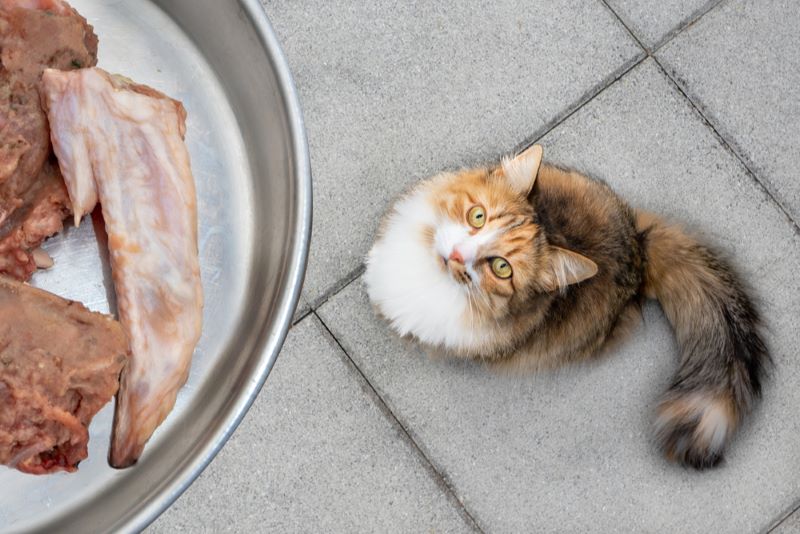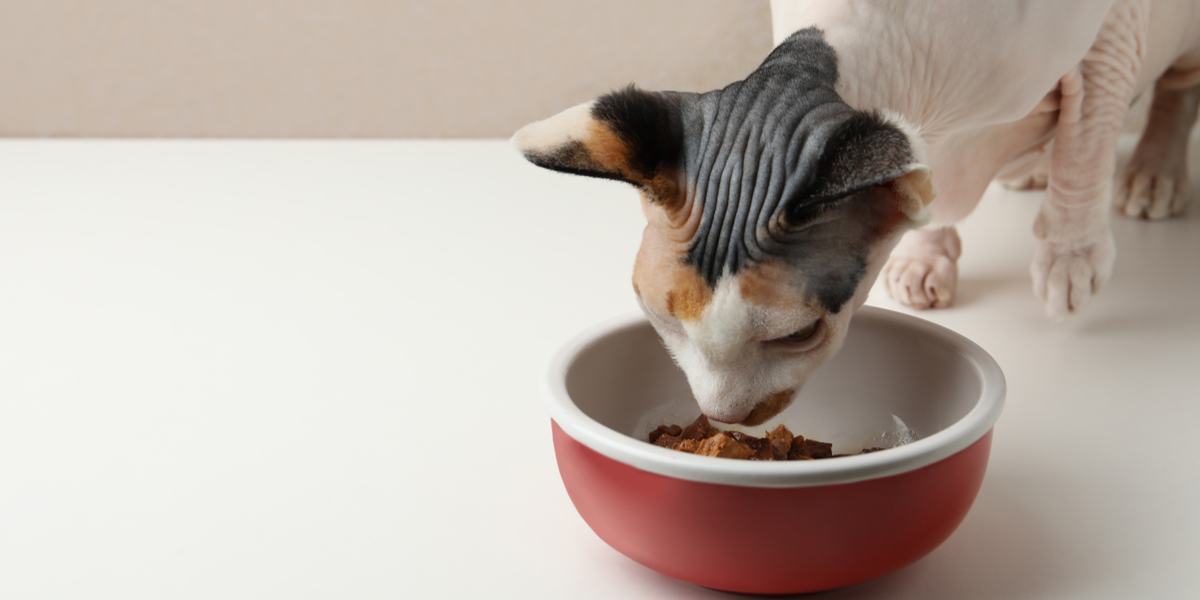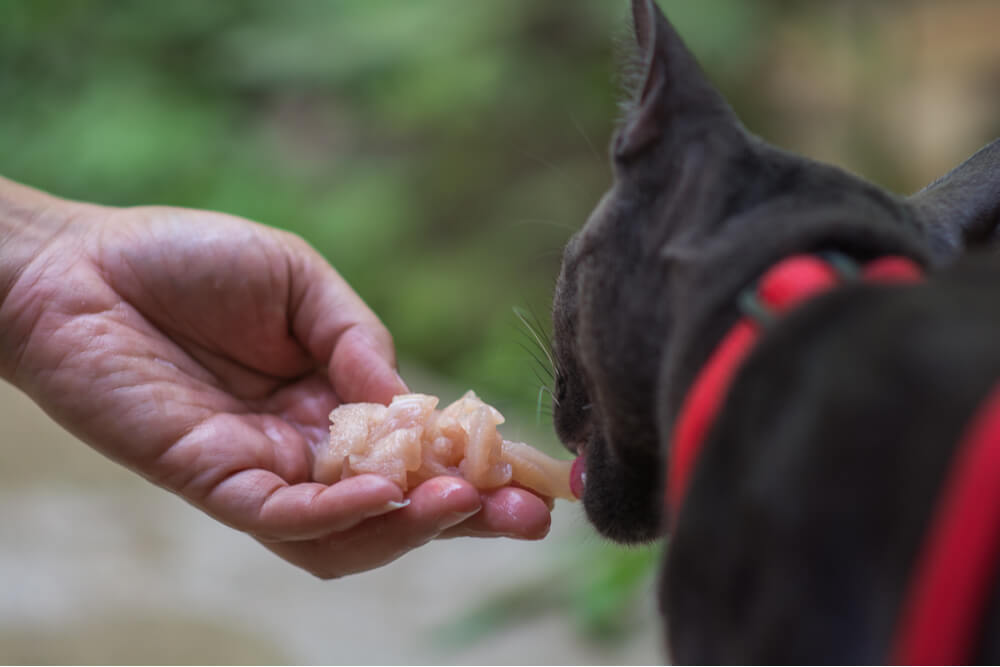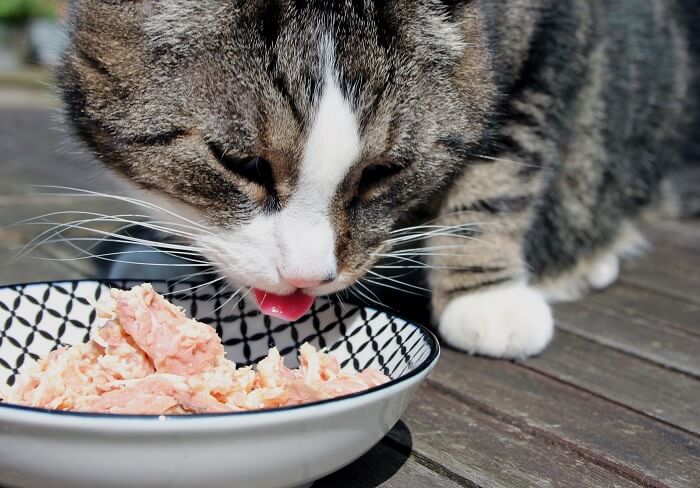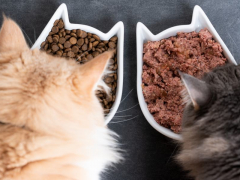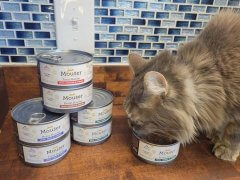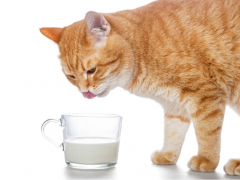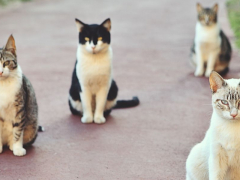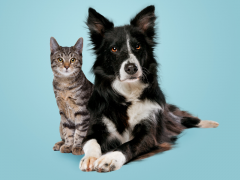If your feline family member is a bit of a hunter, you might spot them chasing mice or birds in the garden occasionally. If they’re successful, you might even notice them eating whatever they’ve caught.
So, if cats can eat raw rodents, can cats also eat raw chicken? Well, of course, the answer is yes; cats can eat raw chicken.
But there are a few risks and reasons why it might not be the best idea. Keep reading to find out the benefits and risks of feeding your cat raw meat, whether it’s raw chicken breast, thighs, or even raw chicken liver.
Feeding cats a raw chicken diet is possible under the right conditions and with proper supplementation, but it should be done carefully and with the guidance of a veterinarian or feline nutritionist.Quick Overview: Can Cats Eat Raw Chicken?
Toxic: No
Commonly Allergenic: No
Species Appropriate: Yes
How Often to Feed: Supplemental
How Much to Feed: Occasional
Summary of Content
Raw Chicken Nutritional Stats
The table below shows some nutritional information for half a raw, skinless chicken breast (95g). Don’t forget that the values will be slightly different for other parts of the chicken. For example, raw chicken skin and chicken liver will be higher in fat than chicken breast meat.
| Calories (kcal) | 114 |
| Protein (g) | 21.5 |
| Fat (g) | 2.5 |
| Carbohydrate (g) | 0 |
| Fiber (g) | 0 |
| Sugar (g) | 0 |
| Sodium (mg) | 42.5 |
| Calcium (mg) | 4.5 |
| Phosphorus (mg) | 95 |
| Zinc (mg) | 0.6 |
| Potassium (mg) | 315.5 |
| Iron (mg) | 0.3 |
Is Raw Chicken Good for Cats?
While cats can eat raw chicken, it’s important to ensure that they do so safely.
Being low in fat and sugars means that raw chicken isn’t going to cause your cat to get chunky, which is great because being overweight is a health risk. The fact that chicken, whether cooked or not, contains lots of protein means that it’s perfect for keeping your cat’s muscles and other soft tissues healthy.
Also Read: Cat Weight Calculator
Be aware, though, lots of protein isn’t always a good thing. Certain health conditions, like kidney disease, require a diet with restricted protein.
Chicken contains a few important vitamins, including vitamin E, an excellent antioxidant. It also has lots of phosphorus and some calcium, which are vital for keeping your cat’s bones and teeth in tip-top shape.
The magnesium in chicken is essential for their immune system and their nerve and muscle function. Chicken is also rich in potassium, which has various roles, including fluid and blood pressure regulation and muscle contraction.
It’s important to remember that your cat will experience these benefits from chicken, whether it’s cooked or raw. So, perhaps the more important question is, are there any specific benefits of feeding raw chicken to your cat?
Well, some people claim that feeding raw food aids our furry friends with their digestion and keeps their skin and coat healthy. However, there’s currently no evidence to prove that this is the case.
How Much Raw Chicken Can a Cat Eat?
Whenever you feed something new to your pet, it’s best to offer a tiny amount first to check it doesn’t upset their tummy. So, if you do decide to offer your furry family member some raw chicken, you should start by offering a tiny piece of chicken breast the size of your fingernail.
You should make sure that you only give the breast meat, rather than any skin or raw chicken bones. But, even if you only feed a tiny amount of breast meat, feeding raw chicken to your cat comes with some unavoidable risks, including parasites and bacteria.
Do Cats Like the Taste of Raw Chicken?
Cats are carnivores, and they’re also hunters. So, it stands to reason that they enjoy the taste of raw meat, including chicken. However, compared to other foods, like fish, raw chicken isn’t very strong smelling.
This means that if you’re chopping raw chicken, your cat might not be frantically begging for a bite, at least not as much as if you had tuna or sardines!
How Often Can a Cat Eat Raw Chicken?
Because of the risks involved and the fact that any claimed benefits are unproven, it’s probably best not to feed your cat raw chicken. Yet, if you decide to, you should only offer it as an occasional treat. This is because your cat must eat their regular cat food to get the nutrients they need.
Giving them a small piece of raw chicken breast once or twice a week would be reasonable. If you decide you want to feed your cat a raw food diet full time, you should use a commercial raw food diet that is certified as nutritionally complete or get a veterinary nutritionist to formulate a recipe for you to follow at home.
Also Read: The 6 Best Raw Cat Food – Healthy Picks For Your Carnivore
This will ensure that your favorite feline gets everything they need and doesn’t suffer from a nutritional deficiency that could damage their health.
Is Raw Chicken Used in Commercial Cat Food?
Yes, some commercial raw food diets contain raw chicken. Of all the options, commercial cat food is by far the safest way to feed your cat raw chicken. This is because it is nutritionally balanced and complete.
Make sure that you don’t choose a raw food diet that contains raw chicken bones, though, as these can damage your cat’s intestines or even cause a blockage. On the other hand, feeding a raw food diet is never completely safe, so let’s find out more about the risks.
Is Raw Chicken Dangerous for Cats?
There are many risks associated with feeding raw chicken to your cat. The first is bacterial contamination. Raw chicken can carry bacteria like E Coli, Salmonella, and Campylobacter, meaning that your cat could become unwell.
Not only that, but the bacteria could also remain around your cat’s mouth after they’ve eaten and can be transferred onto household surfaces, clothing, or even people’s hands.
This means that the chances of you or your family members picking up some nasty bugs are pretty high, even if you try to keep things hygienic. It’s not just bacteria that raw meat can carry either.
Your cat’s raw chicken could also contain parasites like tapeworms and roundworms, especially if you feed raw chicken liver or other entrails.
Another risk of feeding raw chicken is damage to your cat’s teeth or intestines from bones. Bones could cause your cat a painful tooth fracture or cause a gut blockage, and sharp fragments could even perforate their intestines.
As with any homemade diet, there is also a risk of nutritional deficiencies. This is especially common with raw food because balancing a cat or dog’s diet is incredibly complex.
One risk that should be avoided is feeding raw chicken skin or other fatty portions, like the liver. Rich and fatty foods may cause your cat to develop a painful condition called pancreatitis. So, it’s best to stick to breast pieces.
Summary
There’s lots of debate about whether it’s safe to feed your cat raw meat and the potential benefits if you do. However, at the moment, there are no proven benefits to feeding your cat raw food.
With so many associated risks, it might be best to avoid giving your cat raw chicken or other raw meat without proper supervision from a veteran . This way, you can keep your family and your cat as healthy as possible!
Frequently Asked Questions
Can house cats eat raw chicken?
Any cat can eat raw chicken, and many would enjoy it. However, the risks posed by feeding your cat raw meat means that it's probably better for you, your cat, and your family if you stick to a standard, complete cat food.
Is it safe to feed cats raw chicken?
Raw chicken can carry bacteria like Campylobacter and Salmonella, which are often associated with food poisoning in people. These bacteria could also make your cat unwell. However, your cat could also transfer these bacteria onto you or your family when you pet, groom, cuddle or kiss them. These bacteria are not the only risk, though. Other hazards include damage from bones and nutritional deficiencies.
What raw meat can cats eat?
It's best to avoid feeding raw meat to your cat altogether. This is because it's tough to avoid the risks posed by bacteria and parasites. However, if you decide to feed your cat raw meat, use a commercial raw cat food or consult a veterinary nutritionist.
